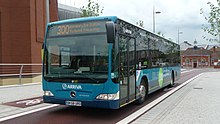|
Single-deck bus
  A single-decker bus or single-decker is a bus that has a single deck for passengers. Normally the use of the term single-decker refers to a standard two-axled rigid bus, in direct contrast to the use of the term double-decker bus, which is essentially a bus with two passenger decks and a staircase. These types of single-deckers may feature one or more doors, and varying internal combustion engine positions. The majority of single-deckers have a length of up to 12 m (39 ft 4 in), although some exceptions of longer buses exist. They also typically weigh between 11 and 14 t (12 and 15 short tons).[1][2] In regions where double-deckers are not common, the term single-decker may lack common usage, as in one sense, all other main types of bus have a single deck. Also, the term may become synonymous with the name transit bus or related terms, which can correctly be applied to double-deckers too. With the exception of regions of major double deck or articulated bus operation, usually major urban areas such as Hong Kong, cities in the United Kingdom and Singapore, the single decker is the standard mode of public transport bus travel, increasingly with low floor features. With their origins in van chassis, minibuses are not usually considered single-deckers, although modern minibus designs blur this distinction. Midibuses can also be regarded as both included with and separate from standard single-deckers, in terms of full size length and vehicle weights, although again design developments have seen this distinction blurred. Some coach style buses that do not have underfloor luggage space can also be correctly termed as single-deckers, with some sharing standard bus chassis designs, such as the Volvo B10M, with a different body style applied.  Notable examples of single-decker buses (excluding coaches, trolleybuses, midibuses and minibuses)
See alsoWikimedia Commons has media related to Single-deck buses. References
External links |
